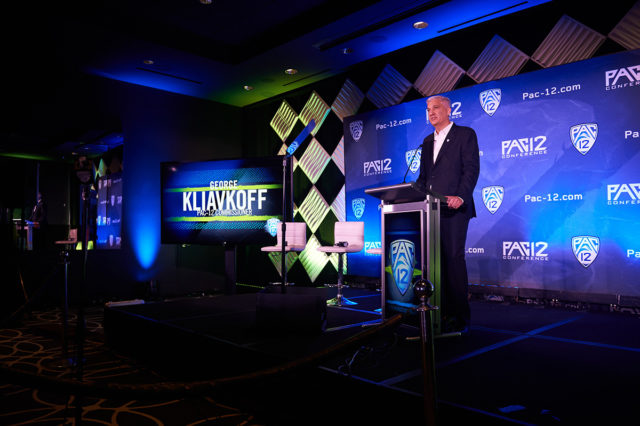This post was updated Aug. 1 at 8:35 p.m.
To expand or not to expand.
That is the decision facing new Pac-12 commissioner George Kliavkoff just weeks into his tenure.
With Oklahoma and Texas’ reported future move to the SEC, conference expansion and realignment have been hot talking points within the college athletics world.
At the 2021 Pac-12 Football Media Day on Tuesday morning, Kliavkoff said Pac-12 expansion isn’t necessary and the changing landscape only makes the conference stronger.
“We believe the move by Texas and Oklahoma from the Big 12 to the SEC strengthens our unique position as the only Power Five conference with teams in the Mountain and Pacific time zones,” Kliavkoff said. “We have a stable, highly successful and well-positioned membership with a high bar to entry. Given our investments in football and men’s basketball (and) our historic domination of other sports, we do not think expansion is required to continue to compete and thrive.”
The first-time conference commissioner later added that there is no risk with staying at 12 teams. However, Kliavkoff said the opportunity is there to add more schools if conference leadership desires.
“The fallout from Texas and Oklahoma gives us an opportunity to once again consider expansion,” Kliavkoff said. “We already had significant inbound interest from many schools. We will work with our presidents and chancellors to evaluate these opportunities.”
According to multiple reports, the Pac-12 has had discussions with a number of conferences and schools about potential expansion of the conference.
One such idea, reported by The Athletic, is a merger between the Pac-12 and Big 12 that has been discussed by Big 12 leadership in the wake of Texas and Oklahoma’s decision, which would result in a 20-team mega conference.
Other outlets have reported specific schools – such as Baylor, TCU and Texas Tech – have already reached out to Kliavkoff in regard to potentially joining the Pac-12 in the near future.
Kliavkoff declined to comment on specific conversations with any schools.
The logistics of a potential expansion have also been discussed, with questions ranging from the sports that would be involved to the quality of the schools being added to the geographical considerations of any new addition. Currently, no Big 12 team is farther west than the Central time zone, meaning any Pac-12 expansion with the Big 12 would change the boundaries of the conference.
“That is something we’re going to be discussing with our presidents and chancellors,” Kliavkoff said. “We take into account athletics, academics, cultural fit. (Those are) all very important to us. But there is no set bar that anyone needs to clear.”
The Pac-12’s current television rights deal doesn’t officially end until 2024, meaning any official expansion likely won’t happen until then.
Name, image and likeness
Since Kliavkoff took over in July, there has been one other major shift in the collegiate athletics landscape.
New name, image and likeness legislation now allows NCAA student-athletes to monetize their brands and make money through endorsements.
Kliavkoff said the conference supports the new protocol.
“The Pac-12 is in favor of student-athletes being able to benefit from their name, image and likeness, and we welcome the changes that were implemented by the NCAA on July 1,” Kliavkoff said. “We support the opportunity of our athletes to monetize their personal brands just as other students on campus are able to build and market their own intellectual property.”
The new commissioner also announced Pac-12 Networks is launching a new licensing program that will help student-athletes spread content to the companies working with them.
However, while Kliavkoff said he agreed with the decision in NCAA v. Alston that set the stage for such legislation, he said he disagreed with the concurring opinion.
Supreme Court Justice Brett Kavanaugh, who penned the opinion, wrote that the NCAA’s amateur-focused business model would be “flatly illegal” in other industries because of antitrust laws.
Disagreeing with the Supreme Court’s concurring opinion, Kliavkoff said amateurism must remain in college athletics.
“It is likely that some will see the decision in Alston and particularly the language of the single concurring opinion as an invitation to attack the very foundation of the collegiate model,” Kliavkoff said. “Introducing unfettered professional practices into college sports will undermine our educational mission and will have many unintended negative consequences.”
Kliavkoff also hinted that more changes could be coming to the NCAA, with new decentralization and deregulation of college sports on the horizon.
“We’re going to see some shake-up there,” Kliavkoff said. “(NCAA President) Mark (Emmert) has been pretty clear about his desires to have less responsibility set at the NCAA and more responsibility come down to the conferences and the schools. And we welcome that.”
College Football Playoff
Of the 28 teams picked for the College Football Playoff in the seven years since its inception, two have hailed from the Pac-12, both of which came in the first three years of the tournament.
In his opening remarks Tuesday, Kliavkoff said he wants to change that.
“I want to be 100% clear – going forward the Pac-12 conference will make all of our football-related decisions with the combined goals of optimizing CFP invitations and winning national championships,” Kliavkoff said.
A new Pac-12 football working group was also announced by Kliavkoff, which includes the conference’s football coaches and athletic directors.
The group will look at a number of options to help the conference’s football future, including reworking the conference and nonconference schedule structures, changing the start times of games and rethinking the importance of divisions in the conference. Kliavkoff added that the group will consider how to best market the conference to prospective recruits.
The conference did something similar in the past with basketball, and Kliavkoff pointed to UCLA’s Final Four berth as an example of what he wants to happen with Pac-12 football.

